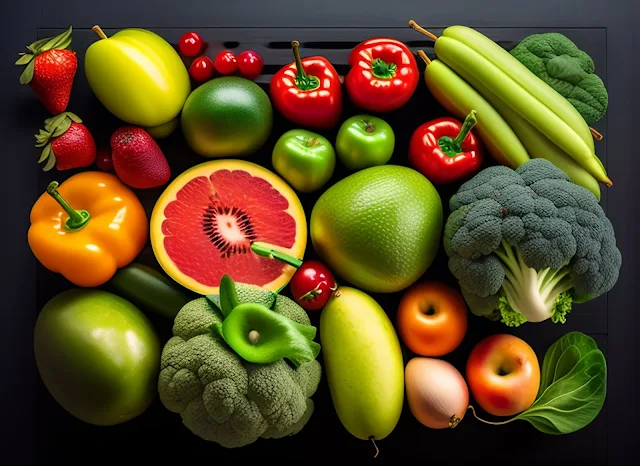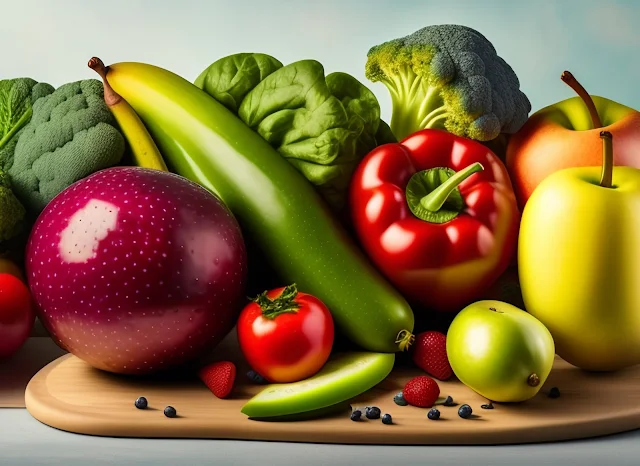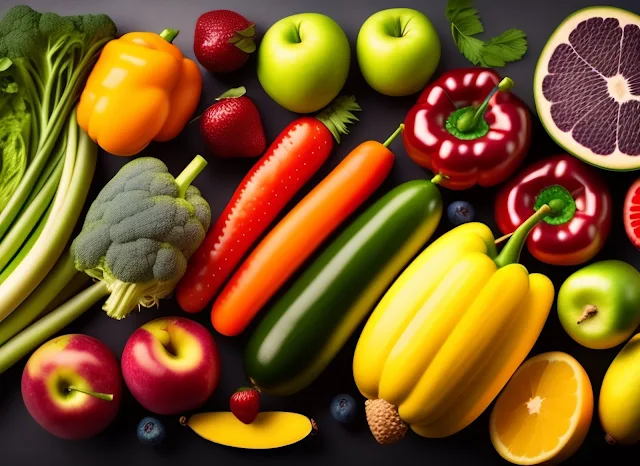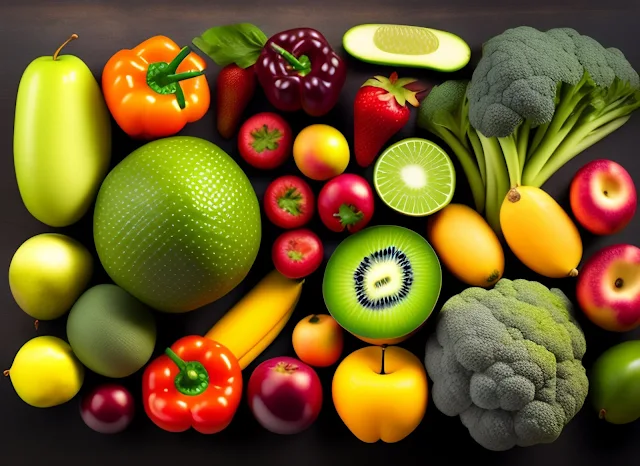The Benefits of Incorporating More Fruits and Vegetables into Your Nutritious Diet
There are numerous benefits to eating more fruits and vegetables, including:
- Improved digestion: Fruits and vegetables are high in fiber, which helps to keep your digestive system running smoothly and prevent constipation.
- Better heart health: Many fruits and vegetables are rich in heart-healthy nutrients like potassium, magnesium, and folate, which help to lower your risk of heart disease.
- Increased energy: Fruits and vegetables are full of vitamins and minerals that help to boost your energy levels and keep you feeling alert and focused.
- Lower risk of chronic disease: A diet rich in fruits and vegetables has been linked to a lower risk of chronic diseases like cancer, diabetes, and heart disease.
- Better weight management: Since fruits and vegetables are low in calories and high in fiber, they can help you to feel full and satisfied, making it easier to manage your weight.
Incorporating more fruits and vegetables into your diet can also improve your skin, hair, and nails, thanks to the vitamins and minerals they contain. So if you're looking to improve your health and well-being, start adding more fruits and vegetables to your meals today!
FAQ
How many fruits and vegetables should I eat each day?
The recommended daily intake of fruits and vegetables varies depending on your age, gender, and level of physical activity, but a general guideline is to aim for at least 5 servings per day. A serving of fruit is about the size of a baseball, while a serving of vegetables is about the size of a tennis ball.
Can I get all the nutrients I need from fruits and vegetables alone?
While fruits and vegetables are an important part of a nutritious diet, it's important to eat a variety of other foods as well to ensure that you're getting all the nutrients your body needs. This might include lean protein, whole grains, and healthy fats, among others.
Are there any fruits or vegetables that are particularly nutritious?
All fruits and vegetables are nutritious in their own way, but some are higher in certain vitamins and minerals than others. For example, leafy green vegetables like kale and spinach are high in iron, calcium, and vitamins A and C, while citrus fruits like oranges are high in vitamin C. Eating a variety of fruits and vegetables will help ensure that you're getting a broad range of nutrients.
Importance of Variety in Fruits and Vegetables
It's important to incorporate a variety of fruits and vegetables into your diet to ensure that you're getting all the nutrients your body needs. Each type of fruit and vegetable has its own unique set of vitamins and minerals, so eating a variety of different types will give you the most benefit.
For example, red and yellow vegetables like bell peppers, tomatoes, and squash are high in beta-carotene, while green vegetables like broccoli and spinach are high in vitamin K. Eating a mix of different colored fruits and vegetables will help you get a wide range of nutrients and provide the most benefit for your health.
Convenient Ways to Incorporate More Fruits and Vegetables into Your Diet
Adding more fruits and vegetables to your diet can seem like a daunting task, but there are many convenient and easy ways to do it. Here are a few ideas:
- Snack on fruit: Keep a bowl of fruit on your kitchen counter or in your office so that it's easy to grab when you're feeling hungry.
- Add veggies to your meals: Add a side of steamed or roasted vegetables to your lunch and dinner. You can also add sliced veggies to sandwiches or wraps.
- Make a smoothie: Blend together your favorite fruits and veggies for a quick and nutritious breakfast or snack.
- Try new recipes: Experiment with new recipes that feature fruits and vegetables as the main ingredients. There are many delicious and healthy recipes out there that are easy to make and packed with nutrients.
The Benefits of Eating Fruits and Vegetables in Season
Eating fruits and vegetables in season is another way to maximize the nutritional benefits and taste of these foods. When fruits and vegetables are in season, they are at their peak in terms of flavor and nutrition, as they are grown in optimal conditions for their growth and development.
Not only does eating in-season produce to provide you with the freshest and most flavorful foods, but it can also be more cost-effective. Fruits and vegetables that are grown in season are often more readily available and therefore less expensive than those that are out of season.
Additionally, eating in-season produce supports local farmers and helps to reduce the carbon footprint associated with transporting products from other countries. So not only are you getting the most nutritious fruits and vegetables, but you're also doing your part for the environment.
Fruits and Vegetables for Specific Health Conditions
Certain fruits and vegetables can also have specific health benefits for certain conditions. For example:
- Leafy green vegetables like spinach and kale can help to lower your risk of heart disease and improve your eye health.
- Berries like blueberries and strawberries are high in antioxidants and can help to improve brain function and protect against memory loss.
- Citrus fruits like oranges and lemons are high in vitamin C and can help to boost your immune system and protect against colds and flu.
- Cruciferous vegetables like broccoli and cauliflower contain compounds that can help to protect against cancer.
If you have a specific health condition, speak to your doctor or a registered dietitian about which fruits and vegetables are best for you.
In Summary
Incorporating more fruits and vegetables into your diet has numerous benefits for your health, including improved digestion, better heart health, increased energy, and a lower risk of chronic disease. Eating a variety of different types of fruits and vegetables, and choosing those that are in season, can help you get the most nutritional benefit. So start adding more fruits and veggies to your meals today and enjoy all the benefits that come with a diet rich in these nutritious foods!
Conclusion
Incorporating more fruits and vegetables into your diet is a simple and effective way to improve your health and well-being. These foods are low in calories and high in fiber, vitamins, and minerals, making them an essential part of a nutritious diet. So start adding more fruits and veggies to your meals today, and enjoy all the benefits that come with a diet rich in these nutritious foods!
Frequently Asked Questions (FAQ)
Q: How many fruits and vegetables should I eat per day?
A: The exact number of fruits and vegetables you should eat per day depends on your age, gender, and level of physical activity, but a good general guideline is to aim for at least 5 servings per day. A serving size is roughly equivalent to one medium fruit or 1/2 cup of chopped vegetables.
Q: Can I eat too many fruits and vegetables?
A: While it is difficult to eat too many fruits and vegetables, it is possible to consume too much of certain types, particularly those that are high in sugar or starchy vegetables like potatoes. It's important to eat a variety of different types of fruits and vegetables and to pay attention to portion sizes to ensure that you're getting the most benefit.
Q: What are some tasty ways to incorporate more fruits and vegetables into my diet?
A: There are many delicious and easy ways to add more fruits and vegetables to your diet. Some ideas include snacking on fruit, adding veggies to your meals, making a smoothie, or trying new recipes that feature fruits and vegetables as the main ingredients. Experiment with different fruits and vegetables and find what you like, and try to incorporate them into your meals and snacks in new and creative ways.
Final Thoughts
Eating a diet rich in fruits and vegetables is one of the best things you can do for your health. These foods are low in calories, high in fiber, vitamins, and minerals, and provide numerous health benefits. So start incorporating more fruits and vegetables into your diet today and enjoy the many benefits that come with a diet rich in these nutritious foods!
Start your journey towards a healthier, happier you today by incorporating more fruits and vegetables into your diet. Don't wait for tomorrow, make the change now and experience the countless benefits that come with a nutritious diet.
Every small step counts, so take the first step toward a brighter future and see where this new habit takes you.
Don't miss out on the chance to improve your health and wellness, act now and make the change to a nutritious diet!
You're on a journey to better health and wellness, and your next step is incorporating more fruits and vegetables into your diet. You know that this simple change can bring a wealth of benefits, but the real question is - how will this impact your life in the long run? Will you have more energy? Will you sleep better at night? Will your skin look clearer and brighter? The possibilities are endless, but the only way to find out is to take action.
So what will it be? Will you take the leap and see where this new, nutritious diet will take you? The suspense is building, and the only way to find out is to start incorporating more fruits and vegetables into your daily meals.
The journey to a healthier you awaits, but the real question is - will you take the first step?





Join the conversation
What's your favorite way to incorporate healthy habits into your daily routine?